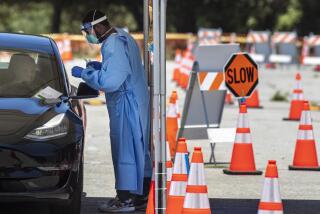National Screening for Cholesterol Proposed
- Share via
While the federal government’s National Heart, Lung and Blood Institute says it isn’t quite ready to unleash national screening programs to monitor cholesterol levels in the blood, one of the nation’s most prominent heart experts says he thinks such a program could be ready for large-scale use within a year.
This would introduce, said Dr. William Castelli, head of the famed Framingham (Mass.) Heart Study, a new era of awareness of the consequences of high amounts of fat in the blood that could rival the success of blood pressure screening programs in the early 1970s. Those campaigns taught millions of Americans that hypertension--a term with which few people outside the medical profession were then familiar--is an often symptom-free disease that kills through the effects of high blood pressure.
This new national campaign--which has already taken shape in at least three test projects scattered across the country--could eventually involve neighborhood screening campaigns.
The screenings, which would depend on testing equipment still not quite--though almost--perfected could make it as easy to find out how much fat you have in your blood as it is now to check your blood pressure. The screening program would rely on machines that can analyze, within three minutes, the amounts of total cholesterol, two different subgroups of cholesterol and other blood chemicals from a sample the size of just a single drop of blood from a pinprick at the end of a finger, Castelli said.
“We are about to have in America a new crusade on cholesterol,” Castelli said. “And the sooner we do it and get on with it the sooner we are going to have a bigger fall in the rate of heart attack and stroke in the country.
“What we’re saying is the American way of eating is really unhealthy.”
But some top federal government experts say Castelli’s perception of the practicality of such a massive, nationwide, screening-based program may be premature.
Dr. James Cleeman, head of the National Heart, Lung and Blood Institute’s cholesterol monitoring program, said one obstacle standing in the way of a major screening campaign is uncertainty whether the health care system could handle the estimated one quarter of all Americans who, it is estimated, would turn out to have unacceptably high blood fat levels.
“We don’t know yet what role local screenings will take,” Cleeman said. “Our basic message (right now) is: ‘The next time you see your physician, ask about your cholesterol
“The reason we’re not saying let’s have nationwide screening (quite yet) is that we’re not sure how the medical system will be able to handle having 25% of the population thrown at it simultaneously.
“Also, we think there is enormous promise in those (screening) machines, but the reliability has not been sufficiently demonstrated.
“We don’t say don’t do it, but we’re saying that while screening may be valuable, several other things have to be said. If your cholesterol is high, you certainly need to have it confirmed and follow up.
“But even if it isn’t high, we know that the average cholesterol level is too high.”
More to Read
Sign up for Essential California
The most important California stories and recommendations in your inbox every morning.
You may occasionally receive promotional content from the Los Angeles Times.












